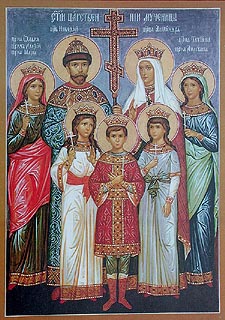Royal Passionbearers Tsar Nicholas (Nikolai), Tsaritsa Alexandra, Tsarevich Aleksy, Grand Duchesses Olga, Tatiana, Maria, Anastasia

Saint Nicholas, the last Russian Tsar, was born in 1868. As a child, he was very religious, guileless and free from malice.
Nicholas II was crowned as Tsar in 1894, following the death of his father Tsar Alexander. He began his reign with lofty hopes for peace, urging other nations to reduce the size of their armies, and to seek the peaceful settlement of international disputes. The Peace Conference at the Hague in 1899 laid the groundwork for the League of Nations and the United Nations.
He married Princess Alice of Hesse, who converted to Orthodoxy and took the name Alexandra. Their children were Olga (1895), Tatiana (1897), Maria (1899), Anastasia (1901), and Alexis (1904).
The glorification of Saint Seraphim of Sarov took place on July 19, 1903, and Tsar Nicholas attended the ceremonies at Sarov with his family. At that time he was given a letter written by Saint Seraphim more than seventy years before, which seemed to disturb him. Although the Sovereign never revealed the letter’s contents, it is believed that it was a prophecy of the bloodshed that would engulf Russia in less than fifteen years.
Saint Nicholas was executed by the Bolsheviks at Ekaterinburg on July 4, 1918 along with his family and servants. The prisoners were awakened late at night and ordered to get dressed for travel. They went down to the cellar of the home in which they were being held, waiting for the word to leave. The Tsar sat on a chair in the middle of the room holding his son Alexis in his lap, while his wife and daughters stood around them.
The executioners entered the room and read out the order for their execution. Saints Nicholas and Alexandra died under the hail of bullets, but the children did not die right away. They were stabbed and clubbed with the butts of rifles. Their bodies were taken to an abandoned mine, cut into pieces, then piled in front of the mine. Sulphur and gasoline were poured on the bloody mound and set on fire. When the fire went out two days later, whatever remained of the bodies was thrown into the mine and grenades were tossed into it. Then the ground was plowed so that no trace of the disposal of the bodies remained.
